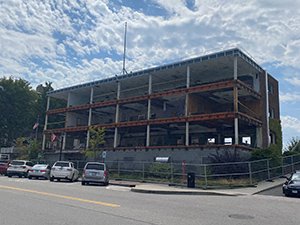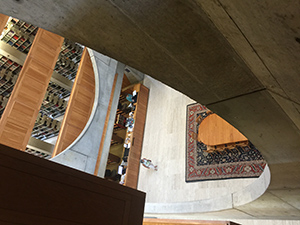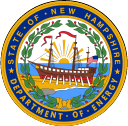Transparency
Transparency is essential to the work of the Office of the Consumer Advocate. First and foremost, we strive to be transparent ourselves as required by New Hampshire law.

(Transparency at state agencies is important
but you do not necessarily have to remove the
outer walls of your building, as happened with
this former state agency headquarters in
Concord, shown under demolition in 2022.)
At the Office of the Consumer Advocate, we strongly believe that the interests of New Hampshire's residential utility customers are advanced when regulatory proceedings are as public as possible and the documents associated with those proceedings are as publicly available as possible. That's why we are a strong proponent of vigorous enforcement of the state's public meetings and public records statute – RSA 91-A, the Right to Know Law.
The disclosure exemption in the Right to Know Law for "confidential, commercial, or financial information" is frequently invoked – not always, but usually – by utilities when they provide information to the Public Utilities Commission. We often oppose confidentiality motions and other efforts to shield information in the files of the PUC from public disclosure. We do that even though we generally have access to confidential materials. (Note that in those circumstances, we are obliged to follow the PUC’s rulings and cannot publicly disclose documents the PUC has ruled to be non-public.)
Although the issue has not been definitively settled by either the Courts or the Legislature, we believe the Right to Know Law is a disclosure statute, not a privacy statute. In other words, we think the disclosure exceptions in the statute are discretionary and that the PUC (or other public bodies) are never obliged to keep anything private under RSA 91-A – even when utilities or other parties claim they are entitled to non-disclosure. So far, the New Hampshire Supreme Court has declined to rule on this issue, suggesting instead that the Legislature address it.
The open meetings provisions of the Right to Know Law mean that hearings at the Public Utilities Commission, as well as meetings of the Energy Efficiency and Sustainable Energy Board, the Residential Ratepayers Advisory Board, and other public bodies in New Hampshire, must be open to public attendance. There are exceptions for discussion of confidential information.
At the OCA, we understand that it is good public policy to keep some information in the files of government agencies, and some information discussed at hearings and other meetings of public bodies, private. We do not oppose every privacy argument – we just think confidentiality determinations should be very rare. The reason is right there in the preamble to the Right to Know Law: "Openness in the conduct of public business is essential to a democratic society. The purpose of this chapter is to ensure both the greatest possible public access to the actions, discussions and records of all public bodies, and their accountability to the people."

This is a glimpse of the atrium at the Philips Exeter Academy
Library in Exeter, designed by the renowned architect
Louis Kahn and widely considered a landmark of 20th
Century American architecture.This vast, open, and compelling
space is a powerful symbol of transparency!



